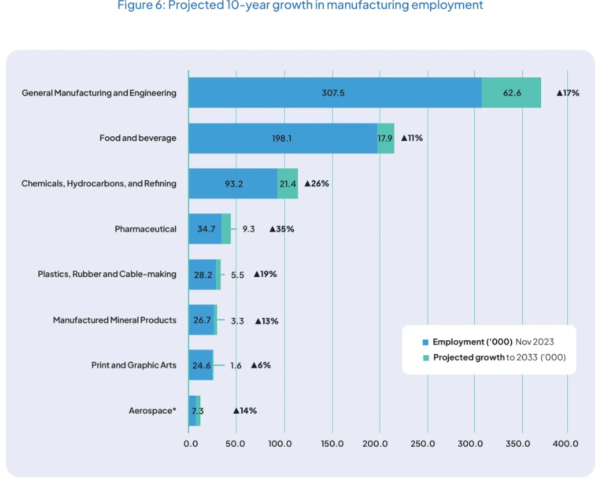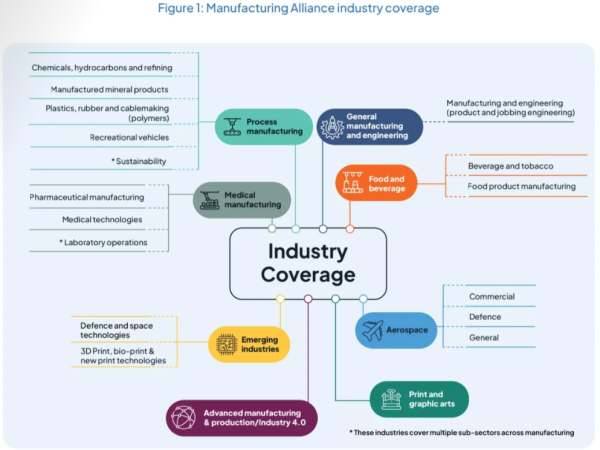Blog: Make Your Own Career From a Base in Vocational Education and Training
Written by Cara Jenkin
Australia’s manufacturing workforce is on the rise thanks to the innovative and high-tech opportunities that the industry now presents.
The number of people directly employed in manufacturing is now at its highest level in 20 years, with the Manufacturing Industry Skills Alliance’s 2024 Workforce Plan showing about 730,000 people are employed.
It is less than the industry’s peak of more than 800,000 workers employed in 1990, as changes in manufacturing technologies, products, regulatory environments and global supply chains caused staff numbers to shift.
However, with the Fourth Industrial Revolution now in effect, the previous peak is forecast to be eclipsed by 2033, when 827,200 people are likely to be employed – a 16% growth rate in the next 10 years.
The growth is forecast to occur across the industry’s eight sub-sectors: food and beverage; print and graphic arts; chemicals, hydrocarbons and refining; pharmaceutical manufacturing; plastics, rubber and cable-making; manufactured mineral products; aerospace; and general manufacturing and engineering.
New sub-sectors also are emerging that will boost the number of jobs created even further and in roles that are yet to be imagined.
Manufacturing relies heavily on vocational education and training qualifications to skill its workers, with Australian Bureau of Statistics figures showing almost half (46%) of its workforce has at least one certificate or diploma to do their job.
The types of VET qualifications and workers required by these sectors are incredibly broad, in line with the variety of work available in manufacturing.
- In food and beverage, factory process workers and food trade workers such as bakers and brewers are employed.
- In print and graphic arts, jobs range from graphic designers to signwriters.
- In chemicals, hydrocarbons and refining, workers include those who work at oil and gas refineries or chemical laboratories.
- In pharmaceutical manufacturing, qualified staff are needed to make vaccines, medicines and vitamins.
- In plastics, rubber and cable-making, anything from the manufacture of clothes to pipes require skilled staff.
- In manufactured mineral products, qualified workers make cement, concrete blocks, pavers and other materials from minerals.
- In aerospace, aircraft maintenance engineers maintain, modify, repair and overhaul airplanes and military aircraft.
- In general manufacturing and engineering, workers include jewellers, boatbuilders and locksmiths.
However, manufacturing is also at the forefront of new frontiers and four new industries are emerging that are creating exciting new opportunities.
3D printing and bio-printing are turning the traditional printing industry on its head.
3D printing is a manufacturing process that creates three-dimensional objects layer by layer from a digital model. An elective as part of a VET qualification can currently help train workers in this technique.
In the health sector, for example, 3D printing is being used to make patient-specific prosthetics and implants.
Bio-printing is a subset of 3D printing that uses biological materials to create tissue-like structures or even organs of the body.
New print technologies go a step further and include 4D, nanoscale and hybrid printing.
Defence and space technologies are the other emerging manufacturing industries that have endless possibilities.
Defence workers manufacture military equipment such as submarines to be built as part of the AUKUS partnership.
Space workers develop satellites and create spacecraft for exploration beyond Earth.
Whether it is welders or robotics technicians, vocational education and training equips these workers to take on this emerging work.
Bridie Searle, 19, is one of the workers to already have her foot in the defence sector, as a project manager for Thales Australia, working at the Garden Island Naval Dockyard.
She initially wanted to be a landscaper but after completing work experience, she found the physical nature of the job was too demanding for her.
However, sitting in a classroom and going to university did not suit her personality nor her style of learning, she says.
“I always knew that VET was the path I wanted to go down because as a kid, that put food on my table – my dad has been a fitter for the past 35 years and my mum worked in business and she also did her qualification through VET,” she says.
“So I saw the amazing life that those qualifications and those skills gave to us and I was always keen on an apprenticeship.”
Bridie looked at other vocational education and training options, and when a traineeship in project management was advertised, she decided to give it a go.
She moved from the Hunter Valley to Sydney at age 17 to pursue the traineeship at Thales Australia, studying a Certificate IV in Project Management Practice, and has not looked back.
“I could be a hairdresser or a plumber or a fitter and I could have made one of those work but it just wasn’t what felt like a perfect fit for me, so I kept looking,” she says.
“I’ve come out of (the traineeship) in a middle-management type of position.
“The thing I pride myself on is the relationships I have with other people and I have built what I would like to think is one of the best rapports with not only management and white-collar workers but within our blue-collar workforce as well.”
Not only is Bridie involved in making military equipment but she has made her career for herself.
At the start of her traineeship, Bridie took an immediate dislike to the administration side of the job. She knew she was in the right field but not the right environment, so she set about creating the job that she wanted.
“I thought project management was going to be very hands-on, however when I started in my traineeship, I was really taken aback by how admin-heavy it was,” she says.
“I was looking out the window and seeing billion-dollar Navy vessels and I’m thinking there’s no way I’m chained behind this desk when all that’s happening out there.
“All it took was a conversation with my boss.”
She discussed that she wanted to be involved with the practical project management and was undeterred by the extra level of difficulty that would involve in her training.
She says she chipped away and worked into the position she wanted.
“I think project management gives you such a diverse set of skills that are transferable across any industry,” she says.
“I’m of the belief that VET can be a game changer for anyone, regardless of what stage they are at in their career.
“For every field and for whatever you want to get into, there’s a vocational education pathway to make that happen for you.
“If you do research and look into it, it will be a game changer for absolutely anyone.”
 Cara Jenkin is a freelance journalist with more than 20 years’ experience working in the print, digital and television media. It included 10 years as the editor of NewsCorp’s Careers employment section, covering topics ranging from education and training to workplace career advice.
Cara Jenkin is a freelance journalist with more than 20 years’ experience working in the print, digital and television media. It included 10 years as the editor of NewsCorp’s Careers employment section, covering topics ranging from education and training to workplace career advice.


